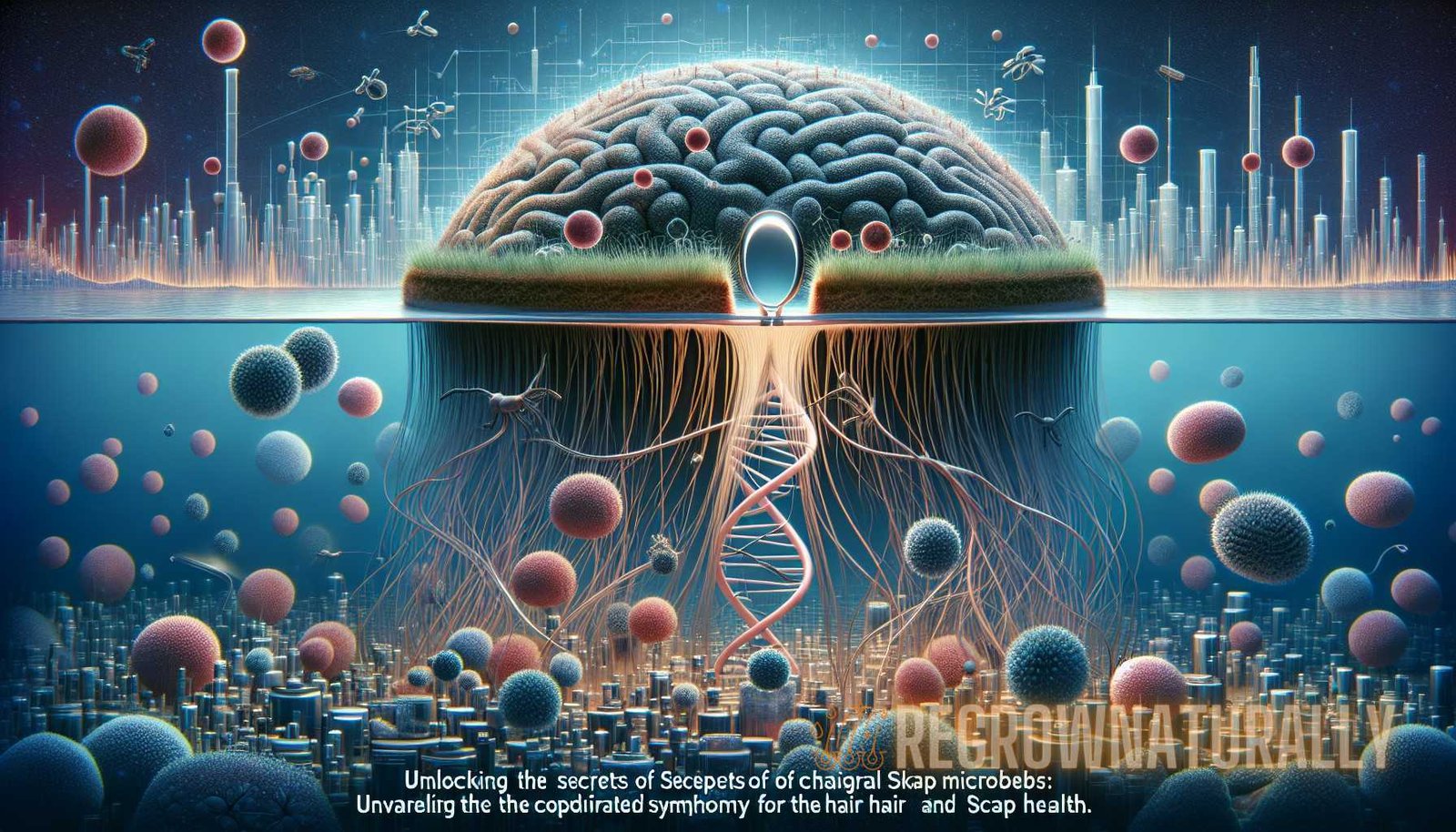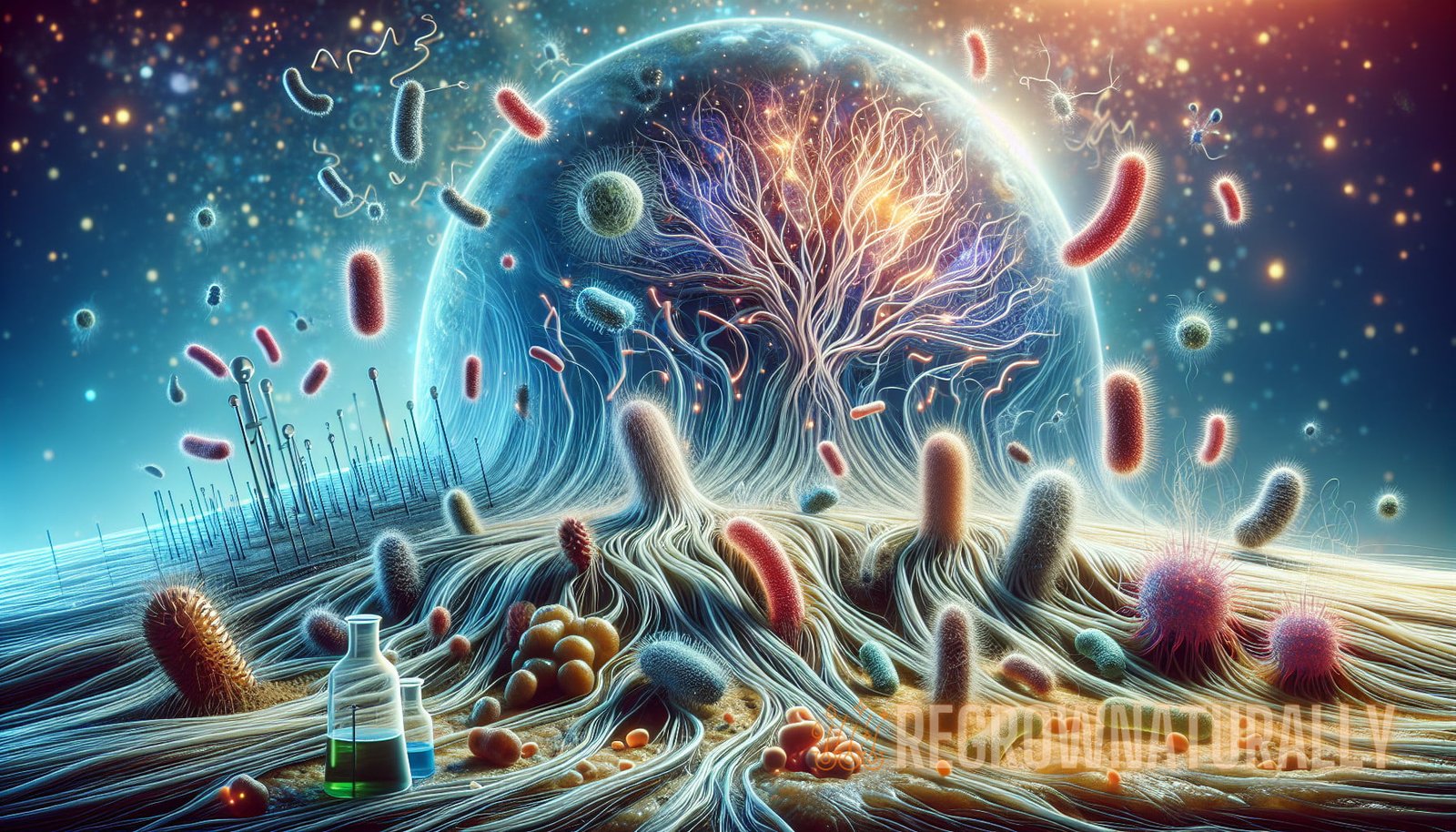Unraveling the Coordinated Symphony: Exploring the Intricate Interactions of Scalp Microbes for Revitalized Hair and Scalp Health
A healthy scalp is the foundation for vibrant, lustrous hair. But what if we told you that there is an entire ecosystem of microscopic organisms residing on your scalp, influencing the health and condition of your hair and skin? Welcome to the fascinating world of the scalp microbiome, a complex network of bacteria, fungi, and other microorganisms that play a vital role in maintaining scalp health and promoting revitalized hair growth.
The Scalp Microbiome: Understanding the Basics
The scalp microbiome refers to the diverse community of microorganisms living on the scalp’s surface. It is characterized by a delicate balance between various bacteria, fungi, viruses, and archaea, which coexist harmoniously to form a complex ecosystem.
These microorganisms have co-evolved with humans over thousands of years to establish a mutually beneficial relationship. The scalp provides a habitat for these organisms, offering nourishment and protection, while they contribute to scalp health by performing specialized functions.
Recent advancements in DNA sequencing technology have enabled scientists to gain insights into the composition and dynamics of the scalp microbiome. Studies have revealed that the scalp microbiome is highly diverse, with hundreds of different microbial species present in any given individual.
Furthermore, the scalp microbiome is unique to each person, influenced by factors such as genetics, age, environment, and lifestyle. Understanding the intricate interactions within this microbial community is crucial for maintaining a healthy scalp and promoting hair growth.
The Role of the Scalp Microbiome in Hair and Scalp Health
The scalp microbiome plays a pivotal role in maintaining hair and scalp health. Here are the key functions performed by these microorganisms:
- Protection against pathogens: The scalp microbiome acts as a natural defense mechanism, preventing the colonization of harmful pathogens that can lead to scalp disorders and hair loss. Certain bacteria and fungi produce antimicrobial peptides that inhibit the growth of pathogenic organisms.
- Balancing sebum production: Sebum, the natural oil produced by the scalp, is necessary for healthy hair growth. However, an imbalance in sebum production can lead to oily or dry scalp conditions. The scalp microbiome helps regulate sebum production by metabolizing sebum components and maintaining its optimal levels.
- Maintaining the scalp’s pH: The scalp has a slightly acidic pH, which is essential for the health of the skin and hair. The scalp microbiome produces acids that help maintain this acidity, creating an unfavorable environment for pathogenic organisms.
- Modulating the immune response: The scalp microbiome interacts with the immune system, playing a crucial role in the development and regulation of the immune response. A balanced scalp microbiome helps prevent excessive immune reactions that can lead to scalp inflammation and hair loss.
- Production of essential nutrients: Certain microorganisms in the scalp microbiome produce vitamins and other essential nutrients that are important for hair follicle health and hair growth. These nutrients include biotin, niacin, and various amino acids.
These functions highlight the intricate interactions and interdependencies within the scalp microbiome. Disruptions in this delicate balance can lead to scalp disorders, including dandruff, seborrheic dermatitis, and even hair loss.
The Impacts of External Factors on the Scalp Microbiome
The composition and dynamics of the scalp microbiome can be influenced by various external factors, including:
- Hygiene practices: Excessive use of harsh shampoos and cleansers can disrupt the balance of the scalp microbiome, leading to an overgrowth of pathogenic organisms or an imbalance in healthy microbes. On the other hand, inadequate hygiene practices can lead to the accumulation of dirt and oils, creating a favorable environment for harmful bacteria and fungi.
- Environmental factors: Environmental factors such as pollution, UV exposure, and temperature fluctuations can impact the composition and diversity of the scalp microbiome. For example, high levels of pollution can introduce harmful pollutants to the scalp, altering the microbial balance.
- Diet and lifestyle: Diet plays a crucial role in shaping the scalp microbiome. Certain foods, such as those rich in probiotics and prebiotics, can promote the growth of beneficial microbes. Additionally, factors like stress and lack of sleep can disrupt the delicate balance of the scalp microbiome.
- Haircare products: The regular use of haircare products containing harsh chemicals, such as sulfates and parabens, can negatively impact the scalp microbiome. These chemicals can strip away the natural oils and disrupt the microbial balance.

Understanding the impact of these external factors is vital for maintaining a healthy scalp microbiome and promoting optimal hair and scalp health.
Promoting a Healthy Scalp Microbiome
Given the crucial role of the scalp microbiome in hair and scalp health, it is essential to adopt practices that promote a healthy microbial balance. Here are some tips:
- Gentle cleansing: Avoid using harsh shampoos and cleansers that can disrupt the balance of the scalp microbiome. Opt for gentle, sulfate-free products that help maintain the natural oils and pH of the scalp.
- Regular scalp massages: Scalp massages not only improve blood circulation but also help distribute the natural oils produced by the scalp. This can nourish the scalp microbiome and promote a healthy balance.
- Probiotics and prebiotics: Incorporating probiotics and prebiotics into your diet can promote the growth of beneficial microbes in the scalp microbiome. Foods like yogurt, kefir, sauerkraut, and whole grains are excellent sources of probiotics and prebiotics.
- Protecting against environmental factors: Use appropriate headwear to shield your scalp from pollution, UV rays, and extreme temperatures. Additionally, consider using hair products with UV protection to minimize damage caused by sunlight.
- Avoiding excessive heat styling: Excessive heat styling can damage the hair and scalp, disrupting the microbial balance. Limit the use of heat styling tools and protect your hair with heat protectant products.
By incorporating these practices into your haircare routine, you can nurture a healthy scalp microbiome and improve overall hair and scalp health.
The Future of Scalp Microbiome Research
Research on the scalp microbiome is still in its early stages, with scientists continually uncovering new insights into the complexities of this microbial ecosystem and its impact on hair and scalp health. Moving forward, here are some areas of focus in scalp microbiome research:
- Developing targeted treatments: Understanding the specific roles of different microbial species within the scalp microbiome can help researchers develop targeted treatments for scalp disorders. This may involve the use of probiotics, prebiotics, or other microbiome-based therapies.
- Unraveling the genetic factors: Investigating the genetic factors influencing the scalp microbiome composition can provide valuable insights into individual preferences and susceptibilities to scalp disorders.
- Exploring probiotic hair products: Researchers are exploring the use of probiotics in hair products to restore and maintain a healthy scalp microbiome. These products may contain live beneficial bacteria that can help rebalance the scalp microbiome.
- Understanding the role of scalp microbiome in hair regrowth: Studies are being conducted to uncover the relationship between the scalp microbiome and hair regrowth. By understanding how microbial interactions can influence the hair growth cycle, researchers aim to develop innovative treatments for hair loss.
As research progresses, we can expect breakthroughs that will revolutionize the way we approach hair and scalp health, harnessing the power of the scalp microbiome to unlock its full potential.
Conclusion
The scalp microbiome forms an intricately balanced community of microorganisms that play a crucial role in maintaining scalp health and promoting revitalized hair growth. Understanding the functions and interactions within this microbial ecosystem is essential for maintaining a healthy scalp and reaping the benefits of lustrous, vibrant hair.
By adopting practices that promote a healthy scalp microbiome and minimizing the impact of external factors, you can support the delicate balance within your scalp and foster optimal hair and scalp health. Ongoing research in this field offers hope for the development of innovative treatments that harness the power of the scalp microbiome for targeted scalp and hair care.
For more information on scalp health and the scalp microbiome, you can read the following articles available at https://regrownaturally.fun/scalp-health/scalp-microbiome-3/ and https://regrownaturally.fun/scalp-health/scalp-nourishment/.


